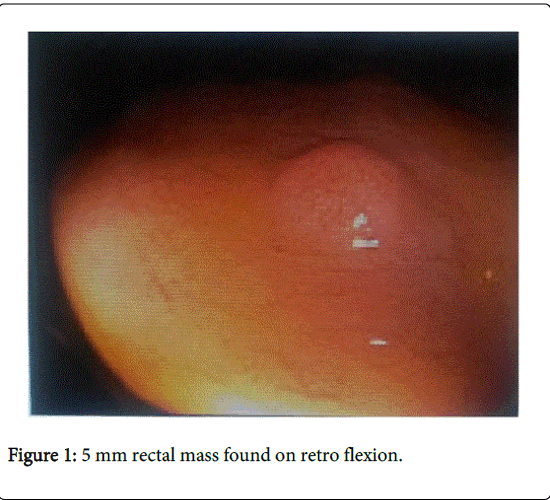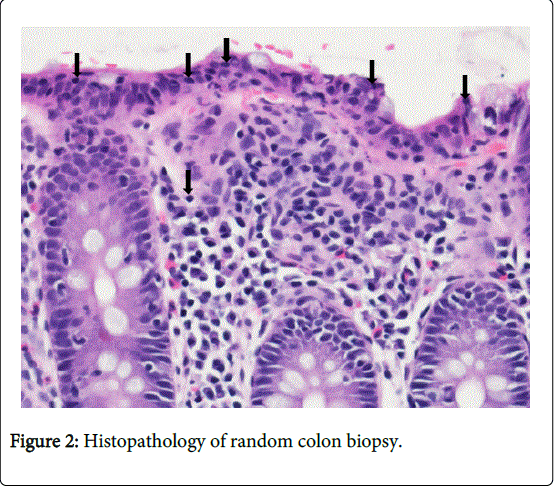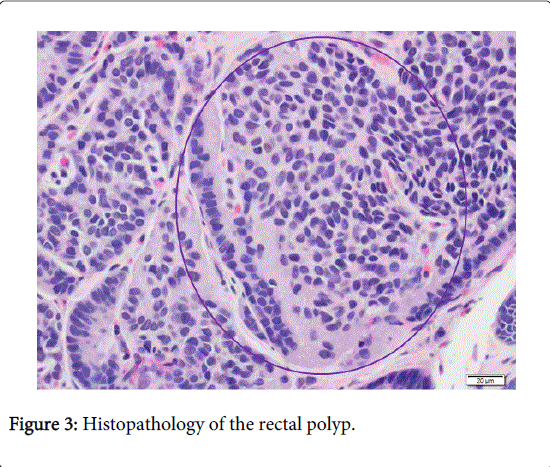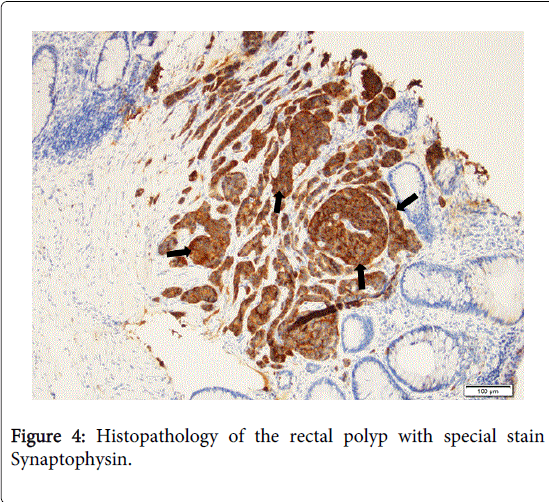Image Open Access
Change in Bowel Habit and Heme Positive Stool
Ayokunle T Abegunde*, Ravindranauth N. Sawh and Kenneth J. VegaDepartment of Medicine, Oklahoma University Health Sciences Center, 920 Stanton L Young Boulevard, Oklahoma City, Oklahoma 73104, USA
- *Corresponding Author:
- Ayokunle T Abegunde, MB, BS, MSc
MRCGP, Gastroenterology Fellow
Section of Digestive Diseases and Nutrition
WP1345, Department of Medicine
Oklahoma University Health Sciences Center
920 Stanton L Young Boulevard, Oklahoma City
Oklahoma 73104, USA
Tel: (405) 271-8001
Fax: (405) 271-5803
E-mail: Ayokunle-Abegunde@ouhsc.edu
Received date: April 2, 2015; Accepted date: April 4, 2015; Published date: April 10, 2015
Citation: Abegunde A, Sawh RN, Vega KJ (2015) Change in Bowel Habit and Heme Positive Stool. J Gastrointest Dig Syst 5:i104. doi:10.4172/2161-069X.1000i104
Copyright: © 2015 Abegunde AT, et al. This is an open-access article distributed under the terms of the Creative Commons Attribution License, which permits unrestricted use, distribution and reproduction in any medium, provided the original author and source are credited.
Visit for more related articles at Journal of Gastrointestinal & Digestive System
Image Article
A 70 year old man was referred for out-patient colonoscopy because of two months history of change in bowel habit, weight loss and heme positive stool. Past medical history was significant for COPD, depression, alcohol dependence, and hypertension.
Colonoscopy revealed normal appearing mucosa in the entire colon and a 5mm sessile polyp (Figure 1) was found in the rectum on retroflexion. Random biopsies were obtained throughout the colon and the rectal polyp was completely excised. Histopathology of random colon biopsies (Figure 2) showed surface epithelial attenuation associated with increased numbers of intraepithelial and lamina propria lymphocytes (>20p/hf) consistent with lymphocytic colitis (LC).
Histopathology of the rectal polyp (Figure 3) showed colonic mucosa with mild hyperplastic changes, and a 5 mm tumor composed of solid nests of small cytologically bland epithelioid cells. Immunohistochemical stains (Figure 4) were positive for synaptophysin and negative for chromogranin consistent with a carcinoid tumor.
LC is a type of microscopic colitis characterized by chronic, watery, diarrhea and increased subepithelial lymphocytes on colon biopsies [1]. The etiology of LC is unknown and it is typically associated with a normal endoscopic appearance [1]. LC has not been associated with an increased risk of colorectal cancer [1]. The rectal carcinoid does not explain the patient’s symptoms of chronic diarrhea and weight loss but may explain the heme positive stool.
Rectal carcinoids represent 1.3% of all rectal tumors; they are usually asymptomatic but may present with rectal pain, bleeding, or constipation; development of the typical carcinoid syndrome is rare [2]. Size of rectal carcinoids correlates with aggressiveness and metastatic potential. Recent series have shown that tumors smaller than 1 cm rarely metastasize, while lymph node and liver metastases are seen in up to 70% of cases if the tumor exceeds 2cm [3].
This case illustrates the fact that change in bowel habits associated with heme positive stool does not always signify colon cancer.
References
- Pardi DS, Kelly CP (2011) Microscopic colitis. Gastroenterology 140: 1155-1165.
- Jetmore AB, Ray JE, Gathright JB Jr, McMullen KM, Hicks TC, et al. (1992) Rectal carcinoids: the most frequent carcinoid tumor. Dis Colon Rectum 35: 717-725.
- de Mestier L, Brixi H, Gincul R, Ponchon T, Cadiot G (2013) Updating the management of patients with rectal neuroendocrine tumors. Endoscopy 45: 1039-1046.
Relevant Topics
- Constipation
- Digestive Enzymes
- Endoscopy
- Epigastric Pain
- Gall Bladder
- Gastric Cancer
- Gastrointestinal Bleeding
- Gastrointestinal Hormones
- Gastrointestinal Infections
- Gastrointestinal Inflammation
- Gastrointestinal Pathology
- Gastrointestinal Pharmacology
- Gastrointestinal Radiology
- Gastrointestinal Surgery
- Gastrointestinal Tuberculosis
- GIST Sarcoma
- Intestinal Blockage
- Pancreas
- Salivary Glands
- Stomach Bloating
- Stomach Cramps
- Stomach Disorders
- Stomach Ulcer
Recommended Journals
Article Tools
Article Usage
- Total views: 15167
- [From(publication date):
April-2015 - Aug 18, 2025] - Breakdown by view type
- HTML page views : 10586
- PDF downloads : 4581




